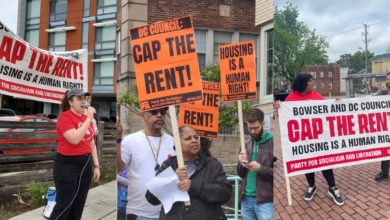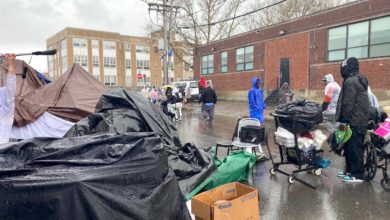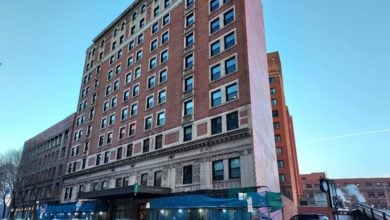On May 2, tenants and housing organizers stormed the stage in the middle of a vote by the New York City’s Rent Guidelines Board proposing to raise rent on the city’s rent-stabilized apartments by as much as 15%. Once on stage, activists read the testimonies of rent-burdened tenants whose lives would be devastated by any increase.
The entire meeting had been met with wall-to-wall disruption by housing justice groups. Even before the vote, hundreds of tenants chanted “rent rollback” and “shame on you” as the meeting proceeded.
In the end, New York City’s Rent Guidelines Board approved a preliminary increase of 2% to 5% for one-year leases and 4% to 7% for two-year leases on rent-stabilized apartments. Before the vote, the landlord representatives on the RGB had proposed a rent hike of over 15% while the tenant representatives had proposed a rent reduction of 1%.
These proposed hikes come at a time when working people are facing inflation rates over 6% and still recovering from the COVID-19 pandemic and economic crisis. According to the RGB’s own 2023 Income and Affordability Study, nearly 40% of all rent-stabilized tenants pay over half their income to their landlord.
The Rent Guidelines Board: unelected and unaccountable
The Rent Guidelines Board, appointed by the mayor, has jurisdiction over the roughly one million rent-stabilized apartments in New York City and the lives of the 2.4 million New Yorkers that live in them. The RGB consists of two tenant representatives, two landlord representatives, and five so-called “public members” who are usually pro-landlord and anti-rent regulation.
Every year, the RGB meets to vote on rent hikes to rent-stabilized apartments. The preliminary vote occurs in May, with the final vote in June.
No reprieve for the working class
Adán Soltren, a tenant representative of the RGB and a housing attorney with the Legal Aid Society, asserted,
Over the decades, RGB chairpersons, different mayoral administrations, and board members themselves all make the offensive mistake of comparing the struggle of working-class Black and Brown people against the performance of an individual person or corporate entity’s investment portfolio. One circumstance is about livelihood, about saving families and communities, and avoiding houselessness, and the other is a business decision about financial gain and loss. They are not the same, and they will never be the same.
Genesis Aquino, the other tenant member on the RGB, echoed Soltren’s sentiment and proposed a 1% decrease in rent prices. Despite the pleas of the people, comments from the RGB’s own tenant members, and the RGB’s own publicly released findings, the so-called “public” members of the RGB voted unanimously to approve the preliminary range of rent increases.
As of 2022, New York City has the highest cost of living in the world. In addition to inflation, rent prices have risen 19% to 29% from 2019 to 2023. 70,000 people walk into homeless shelters each night and many more sleep on streets and subways, despite there being nearly 100,000 vacant apartments in the city.
Instead of addressing the problem of homelessness by providing housing and resources, Mayor Eric Adams has instead waged a war on the houseless population of the city and the working people of the city as a whole by allowing his appointed RGB to propose rent increases that would put millions at risk of eviction and homelessness.
Adams has personally appointed seven of the current RGB members and unlike his predecessor, Bill De Blasio, has not pressured them at all to freeze rent hikes or even to keep them low. The policymakers who keep thousands houseless are directly endangering people, as seen in the recent murder of houseless New Yorker Jordan Neely and the increase in crimes against the houseless in the city.
Without a fight-back from tenants, the RGB will vote to raise the rent, regardless of the conditions working people are facing, as they did last year. The final vote, where the RBG determines what the actual rent increase will be, will occur on June 15. Last year, the Board approved a rent increase of 3.25% on one-year leases and 5% on two-year leases, the highest in decades.
There is only one solution to make sure the almost 6 million tenants of this city can stop these increases and their impact. To democratically represent the city, the Rent Guidelines Board must be controlled by tenants, and it must act to protect their interests.
If you live in New York City, join us at the RGB final vote at 5 p.m. at St. Francis College Auditorium, 179 Livingston Street, Brooklyn, NY 11201 to demand that they stop the rent hike.






